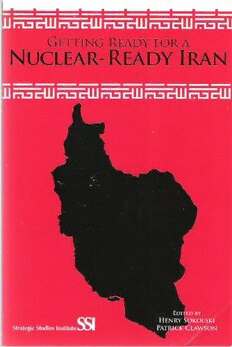
Getting Ready for a Nuclear-Ready Iran PDF
323 Pages·2005·1.178 MB·English
Most books are stored in the elastic cloud where traffic is expensive. For this reason, we have a limit on daily download.
Preview Getting Ready for a Nuclear-Ready Iran
Description:
Little more than a year ago, the Nonproliferation Policy Education Center (NPEC) completed its initial analysis of Iran’s nuclear program, Checking Iran’s Nuclear Ambitions. Since then, Tehran’s nuclear activities and public diplomacy have only affirmed what this analysis first suggested: Iran is not about to give up its effort to make nuclear fuel and, thereby, come within days of acquiring a nuclear bomb. Iran’s continued pursuit of uranium enrichment and plutonium recycling puts a premium on asking what a more confident nuclear-ready Iran might confront us with and what we might do now to hedge against these threats. These questions are the focus of this volume. The book is divided into four parts. The first presents the findings of the NPEC’s working group on Iran. It reflects interviews with government officials and outside specialists and the work of some 20 regional security experts whom NPEC convened in Washington to discuss the commissioned research that is contained in this book. Some of this report’s findings to keep Iran and others from overtly deploying nuclear weapons or leaving the Nuclear Nonproliferation Treaty (NPT) are beginning to gain official support. The U.S. Government, the International Atomic Energy Agency (IAEA), and an increasing number of allies now support the idea that states that violate the NPT be held accountable for their transgressions, even if they should withdraw from the treaty. There also has been increased internal governmental discussion about the need to clarify what should be permitted under the rubric of “peaceful” nuclear energy as delineated under the NPT. The remaining report recommendations, which were presented in testimony before Congress in March of 2005, remain to be acted upon. Whether they will or will not, of course, depends greatly on how public officials view the Iranian nuclear threat. This, then, brings us to the book’s second part, “Tehran’s Nuclear Endeavors: What’s the Worry?” Richard Russell starts off this section by detailing how Iran’s neighbors are likely to hedge their own security bets as Tehran goes literally more and more nuclear and ballistic. Critical to what these nations might do is just how nuclear-capable they are themselves. This is detailed by Wyn Bowen and Joanna Kidd in their chapter, “The Nuclear Capabilities and Ambitions of Iran’s Neighbors.” In it, we learn just how close Egypt, Saudi Arabia, Turkey, Syria, and Iraq are to acquiring nuclear weapons of their own. The special case of Turkey, a full-fledged North Atlantic Treaty Organization (NATO) ally, is addressed in greater detail in Ian Lesser’s chapter, “Turkey, Iran and Nuclear Risks.” The good news here is that if the European Union and the United States provide proper support on both security and economic fronts, Turkey is unlikely to go its own way. The bigger picture of what might transpire after Iran overtly goes nuclear, though, is sure to be grim. Kenneth Timmerman spells out the increased prospects for war and much more violent terrorism in his chapter, “The Day After Iran Gets the Bomb.” What can be done? The two popular policy options-military strikes against Iran’s known nuclear facilities and imposing economic sanctions against Tehran-are analyzed in the book’s third part, “Is There A Simple Military or Sanctions Fix?” Shlomo Brom, a retired Israeli general, explains why, although it would be extremely popular in Israel to attempt another Osiraq-like raid against Iran’s known facilities, the operational prospects for success are not very high. What of having the United States assume this mission? Thomas Donnelly, a staunch supporter of the invasion of Iraq, explains how launching a limited raid against Iran’s nuclear facilities could jeopardize the larger American campaign to liberalize and moderate the Middle East.
See more
The list of books you might like
Most books are stored in the elastic cloud where traffic is expensive. For this reason, we have a limit on daily download.
